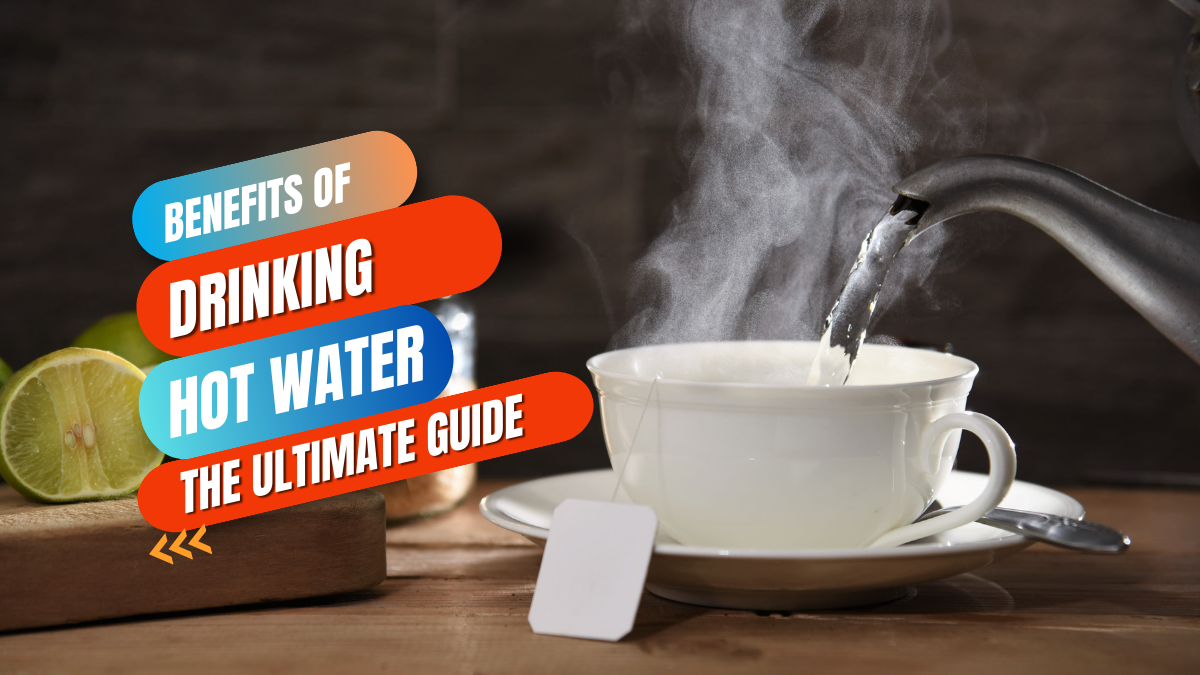In the rich tapestry of Indian wellness practices, the humble act of drinking hot water stands out as a time-tested tradition. Passed down through generations, particularly within Ayurvedic knowledge, its potential benefits are becoming increasingly acknowledged by modern science.
Let’s embark on a journey through the ways this age-old habit can support your well-being. Remember, we mean warm enough to drink comfortably, not boiling hot.
1. Aiding Digestion: Your Internal Cleanser
One of the primary reasons why hot water has been cherished is its ability to enhance digestion. Here’s how its warmth impacts your digestive system:
- Stimulating Movement: Warm water encourages increased motility within your digestive tract. Regularly experiencing sluggish digestion becomes less likely when a gentle stimulating effect works to combat constipation.
- Breaking Down Food: Drinking hot water, particularly after meals, aids in emulsifying fats in your food. This makes it easier for your body to break them down and utilize them optimally.
- Soothing Discomfort: If you’re prone to bloating, cramping, or indigestion, a cup of hot water can be a balm for your discomfort. Its warmth is relaxing and can ease discomfort.
2. Detoxification: Flushing out Impurities
While our bodies have sophisticated detoxification mechanisms, hot water can offer a subtle additional boost.
- Increasing Perspiration: Drinking hot water slightly elevates your internal temperature, leading to mild perspiration. While not a major way to eliminate toxins, sweat does play a minor role in removing some undesirables through your skin.
- Enhanced Elimination: As hot water optimizes digestion, your entire process of waste removal becomes more efficient, further supporting detoxification.
- Potential Kidney Support: Although more research is needed, some experts suggest that warm water intake could assist kidney function. By enhancing filtration processes, it indirectly impacts toxin removal.
Clearing Congestion: Your Natural Decongestant
When a stubborn cold leaves you with a stuffy nose or persistent cough, hot water can step in as a gentle remedy. This is the mechanism at work:
- Loosening Mucus: The steam rising from your hot water helps thin and loosen mucus buildup in your sinuses and throat. This thinning effect promotes easier expulsion.
- Soothing Inflammation: Hot water has mild anti-inflammatory properties, easing irritation and soothing a sore throat.
Hydration: It’s Not Just Plain Water
While regular water is crucial for health, warm water plays a different, complementary role. Here’s why:
- Hydration Plus: When plain water lacks appeal, adding a slice of lemon, some fresh mint leaves, or a little grated ginger elevates hydration. This makes staying hydrated more pleasurable.
- Warmth in Winter: During winter, many find staying hydrated difficult. Opting for warm water throughout the day makes meeting your fluid targets easier.
Stress Relief: A Cup of Calm
In our fast-paced and pressure-filled lives, taking time for simple mindful routines is crucial. Hot water can be part of that self-care:
- Relaxation Ritual: The act of preparing and slowly sipping hot water can become a short break inducing a sense of peace. Focus on the experience – the warmth in your hands, the fragrant steam (if you’ve added anything). Let the stress of the day melt away.
- Better Sleep: A warm, non-caffeinated drink like hot water before bed signals to your body and mind that the time to wind down has arrived.
Other Potential Benefits
- Pain Relief: Drinking hot water could provide temporary relief from headaches or muscle cramps. Its warmth can promote muscle relaxation and has a mildly analgesic effect, akin to using a warm compress on external aches. Some women find it offers modest relief from menstrual cramps.
- Weight Management: While not a miracle cure, hot water intake prior to meals can create a feeling of fullness, helping lower calorie intake. Research shows it can modestly increase metabolism for a short period, and while this isn’t a major calorie burner, every little boost helps.
- Clearer Skin: The effect of hot water on skin health directly is likely minor. However, its positive impact on digestion and detoxification can indirectly benefit skin in terms of its texture and glow.
- Circulation Aid: There’s preliminary evidence that drinking warm water could improve blood circulation. Further studies are needed, but there’s the potential for improved oxygen and nutrient delivery throughout your body.
Making the Most of Hot Water
To reap the best benefits, keep these tips in mind:
- Temperature is Key: Your water should be pleasantly warm, but not hot enough to cause discomfort when drinking. Test it before taking a full gulp!
- Small Sips: Take your time. Savor the drink slowly to maximize its relaxing effects.
- Experiment with Additions: Adding lemon, a dash of honey, some fresh ginger slices, or a sprinkle of turmeric can infuse it with antioxidants and make it even more appealing.
- Avoid Before Bed If …: While many find hot water helps promote sleep, if you tend to wake frequently in the night to use the bathroom, reducing intake near bedtime is best.
It’s essential to exercise caution with hot water. Drinking water that’s too hot can scald the delicate lining of your throat and esophagus. Additionally, avoid excessive intake, as this can dilute essential electrolytes.
As with any wellness practice, it’s advisable to consult your doctor for personalized advice based on your medical history, especially if you have any underlying health conditions.
Conclusion
The humble act of drinking hot water, long hailed in Indian traditions, seems to have much to offer modern-day life.
With its potential to aid digestion, support detoxification, provide natural relief from mild congestion, improve relaxation, and contribute to overall well-being, it remains a simple, gentle, and readily accessible element of self-care.
Of course, it’s not a replacement for a healthy diet, regular exercise, or prescribed medical treatment. Yet, the potential positive effects suggest it may be an overlooked ally in supporting a healthy, balanced lifestyle.

